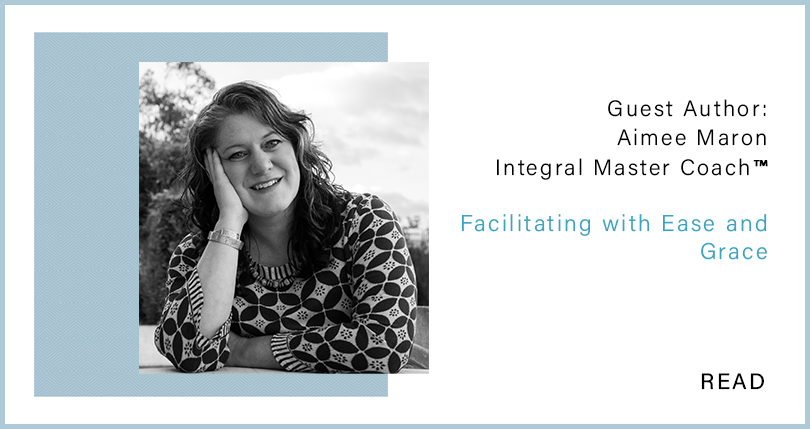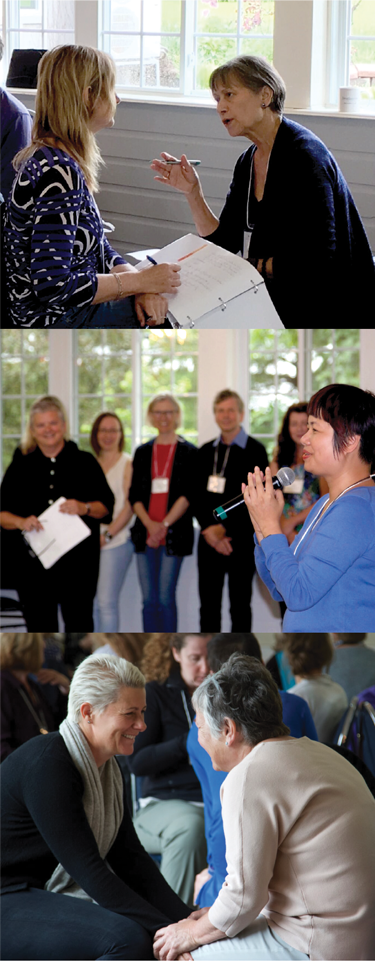

Facilitating with Ease and Grace

Aimee Maron is one such skilled and creative graduate. Aimee lives in Quito, Ecuador, where her facilitation work often involves holding space for, and navigating, the power dynamics, conflicts, personalities across various "social and environmental activists, practitioners, government officials, and Indigenous Peoples from different cultures, backgrounds, and languages".
have been facilitating meetings and events–ranging from small gatherings to large meetings with 150+ attendees–ever since I was 26 years old. It all started during my Master’s program when we were tasked with holding meetings for teachers and students in the context of an institutional merger process. This process was messy, filled with emotions and conflicting visions. Even so, I loved it–I found it challenging, exciting, and stimulating. Despite these sometimes-complex contexts, I consistently find the value and reward in playing a pivotal role in supporting a group of people to achieve a shared objective. And each of the three Integral Coaching® modules I have completed with Integral Coaching Canada (ICC) has helped me to be a more balanced, grounded, and effective facilitator.
Not everyone understands what I do. For some, the term "facilitator" does not mean much–it’s a word that conjures up little understanding of what my work involves. People (including my parents) will often ask, “Facilitator of what?” Merriam-Webster articulates the following definition, which provides a bit more context:

There are many definitions of what it means to be a good facilitator. To me, the beauty of facilitating is that it is a process, and the facilitator is responsible for weaving together methods and tools that bring people along a smooth journey from point A to point B. The role of the facilitator starts with supporting clients to clearly define the objectives of their gathering and who needs to be present to meet them. Once you have this figured out, you move on to designing an agenda and the methodology that will ensure those objectives are met.
I am consistently on a quest to learn more. Over the years, I have added more methods, tools, and practice to my toolkit. I love applying methods from the Liberating Structures community, asking people to consistently address the most critical, challenging questions, and to break with conventions. I even took two graphic facilitation courses. However, what has propelled me on a path towards deeper, more earnest introspection was my training in Integral Coaching®, which supported my growth and development as a human being, a coach, and as a facilitator. My capacity as a facilitator feels more profound and expansive as a result of my training with ICC, which included: taking the time to intentionally explore my inner world and building my own capacity to hold space for the uncertain, the unknown, and the tensions that arise from conflicting interests and different mental models.
Perhaps one of the biggest areas of growth that I have noticed is related to not taking things so personally and being better able to acknowledge and accept that the process and outcomes are not a reflection of my worth as a person. My ICC coach training helped me to realize that even as a coach, I am simply there to “hold the river beds” (as Jill Chitra, one of my amazing ICC mentors, said) of the structure and allow the current (the energy, dynamics, and essence of the people involved) to run through with ease. Understanding this allows me to design a facilitation process in a more daring and bold way–to push clients to ask hard, challenging, sometimes even uncomfortable questions. Another key aspect of not taking things so personally is recognizing my role not as the owner of the process, but as a steward (someone who plays a curating role). I now consistently invite my clients to reflect on their roles in the successes and challenges in each process. I have finally internalized that it’s not all about me and what I did or did not do.
I have also realized that I feel more sure of myself and that means I am no longer seeking the “acceptance” of my clients–I now focus on discerning if it’s a good fit between the client and my team and I. I am responding from my expertise, training, and a genuine curiosity and commitment for those hiring me to have meaningful results and experiences. Concretely, this has meant that, on at least one occasion, I have asked a client if it might make sense to configure the meetings differently to ensure more cross-team pollination and alignment. This ultimately resulted in a contract for fewer meetings and, therefore, a smaller budget. Years ago, I don’t know if I would have dared propose such significant changes to the ideas clients were putting forth, but I have clearly seen the importance of exercising curiosity and leaning into my expertise when engaging with clients to ensure that their processes are as meaningful and effective as possible.
When I think back to about 6 years ago, before I embarked on my ICC journey, I remember feeling overwhelmed by big emotions in the midst of a large, contentious event that I was co-facilitating in Lima, Peru. Today, I can barely remember the details of what was going on in the workshop, but what I do remember is that during a coffee break, I broke down in tears…I felt out of control, dismayed by the conflict that had manifested and the lack of clarity about how we would manage to move forward. Thinking back on this moment, I feel compassion for this young woman just trying to do her best. However, this distance also allows me to see how far my capacities have grown after having dedicated so much time to grounding and exploring my inner world…my emotions, fears, and desires on the path to becoming an Integral Master Coach™. The time dedicated to seeing myself, to noticing and not judging my emotions, and to allowing them to move through me has helped me gain a better understanding of what I need to do to stay balanced and grounded before and during these events.
I have learned to anticipate that every event or gathering has its unique complexities, power dynamics, conflicts, and personalities. This is even more true for the types of gatherings that I tend to facilitate, which often bring together social and environmental activists, practitioners, government officials, and Indigenous Peoples from different cultures, backgrounds, and languages. Now, before I begin facilitating any event, I am always sure to take time to close my eyes and place my hand on my heart to connect briefly with myself, to do at least a brief meditation or a 10-minute plank practice that I do while listening to drumming music.
The importance of these practices has become even more apparent to me as I return to facilitating face-to-face events after two years of the pandemic and hundreds of participatory online events. Going back to face-to-face meetings has proven to be more intense than I remembered–it can be intense and draining, as much as it is a relief to be able to work in person again. So, I consistently lean on these practices to help me show up with the energy, grace, compassion, and composure it takes to steward these events, processes, and meetings towards the most meaningful outcomes possible.
Are you also a facilitator or do you tend to be in charge of running meetings and need a practice that helps you feel grounded before you begin? Here’s a sample practice that I use to ground and connect to my center before doing any facilitation work:
PRACTICE: GROUNDING AND CONNECTING WITH THE STRENGTH OF YOUR BODY
This practice is an opportunity to lean into the strength of your body to feel more grounded and centered. It invites you to connect with the profound stillness that allows you to let things come and go with ease without letting it affect you or your essence. This practice will strengthen the core of your body where your strength is concentrated and it will be an opportunity to build strength and explore how this strength serves as a foundation for ease and flow in the day to day.
Daily Doing
Take between 5 to 10 minutes in the morning (at least 5 days a week) to connect with your inner strength, or the “fire in your belly”. While listening to the “Sacred Drum Meditation Focusing on Root & Heart Chakras” (just under 10-min) track or a shorter track (of about 4 minutes) on Insight Timer, do planks to engage the strength of your entire core, legs and arms.
Shift between forearm plank and extended plank (adding variations to make it easier or harder, as you see fit), digging deep to push yourself physically to hold the pose. When you need to come out of the plank pose and rest, transition into a yoga child’s pose (or balasana) and return to the plank pose when you feel able. When you first start engaging with this practice, you may find yourself in child’s pose more than you are in plank pose, and that is okay. The idea is to build your strength over time and use this practice as a grounding and centering exercise.
Repeat these steps as necessary until the drumming music finishes.
Like it? Share it!





 Download
Download Share
Share


